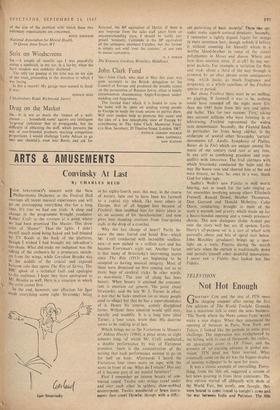ARTS & AMUSEMENTS
Convinsky At Last
By CHARLES .REID lot* STitAviNsxv's concert with the New Philharmonia Orchestra at the Festival Hall overtops all recent musical experiences and will go on overtopping everything else for a long time. It's true we had our trials. A chop and Change in the programme brought coadjutor Robert Craft to the rostrum at a point where We had been promised The Master. This drew cries of 'Shame!' Then the lights. I didn't myself much mind being baked and half-blinded by TV floods at the back of the platform, though I wished I had brought my sub-editor's eye-shade. What did make me indignant was the raking of the orchestra by a premature switch- On from the wings, while Gwydion Brooke was II the middle of the crucial and exposed bassoon solo that opens The Rite of Spring. The BBC speak of a technical fault and apologise to the audience. I hope they have apologised to Mr. Brooke as well. Here is a situation in which the artist comes first.
In the end, however, our affection for Igor made everything come right. Stravinsky being Igor Stravinsky in his eighty-fourth year, this may, in the course of nature, turn out to have been his, farewell to a capital city which, like most others in Europe, first of all hugged him because of Firebird; then snubbed him for thirty years or so, on account of his 'neoclassicism'; and now gives him standing ovations from four-guinea stalls at the drop of a crotchet.
Why this last change of heart? Partly be- cause the once feared and hated Rite—which Mr. Craft conducted with incredible soulless- ness—is now niched in a million ears and has become Everyman's night out. Another factor is that many of Stravinsky's intervening scores since The Rile (1913) are beginning to be accepted as having musical integrity: Most of them were dismissed on first coming out as so many bags of cerebral tricks. In other words, as non-music.' The aim all along has been beauty. When beauty is attained the concomi- tant is emotion sal generis. The point about Stravinsky, said the late W. J. Turner in effect, is not that he lacks emotion (as so many people used to allege) but that he has a superabundance of it. Hence his concise, acutely disciplined forms. Without these emotiOn would spill over, messily and muddily. It is a long time since Turner, a lone voice, wrote thus. His doctrine seems to be sinking in at last.
Which brings me to the Variations in Memory of Aldous Huxley (1964), a piece seven or eight minutes long, of which Mr. Craft conducted a double performance by way of European premiere. Such is the concentration of the writing that each performance seemed to go on for half an hour. Afterwards I heard the Variations four times more on tape, with the score in front of me. What do I retain? Has any of it become part of my mental furniture? First I remember an intense beauty of con- trasted sound. Twelve solo strings crawl under and over each other in spidery. close-webbed counterpoint. Twelve woodwind or brass instru- ments then crawl likewise, though with a differ- ent patterning of basic material. These two epi- sodes make superb textural pendants. Secondly, I remember a tightly argued fugal° for strings (a mere seventeen bars, though nobody'd believe it without counting for himself) which is a worthy blood-brother to some of the atonal polyphonies in Moses and Aaron. Where and how does emotion enter, if at all? In tiny sur- prise packets. For example, a variation for flute and reeds about a third of the way through is crowned by an oboe phrase seven semiquavers long. which packs as much fragrance and poignancy as a whole cantilena of the Firebird species or period.
But about Firebird there must be no sniffing, no giggling. If farewell it was to be. nothing could have rounded off the night more fitly than the 1945 Suite from this sere and splen- did ballet. This for two reasons. First, taking into account millions who were listening in or televiewing, Firebird represented the widest taste denominator. Secondly, the Firebird finale in particular, far from being old-hat, is the archetype of several other Stravinsky 'curtain' movements (cf. Apollo, Symphony of Psalms. Baiser de la Fee) which are unique among thv music of our century (and rare at any time, in any art) as combining grandeur and tran- quillity with innocence. The frail alertness with which Stravinsky conducted the Suite and the way the house rose and cheered him at the end , were history, no less. So, once in a way, thank God for video tape.
Sadler's Wells's new Fidelio is well worth hearing, not so much for the solo singing as for ensembles involving among others Elizabeth Fretwell, Ronald Dowd, Heather Thompson, Don Garrard and Donald McIntyre. Colin Davis. conducting, brought to most of the score a warmth and gravity which made up for a heavy-handed opening and a rowdy prisoners' chorus. The new dialogues (John Arden) put over the story well but are ill spoken. Leslie Hurry's all-purpose set is a sort of wharf with portcullis above and bits of spiral stair below. John Blatchley (producer) brings up a spot- light on a static Pizarro during the march entr'acte when the curtain is traditionally down and permits himself other doubtful innovations. I never saw a Fidelio that looked less like


































 Previous page
Previous page